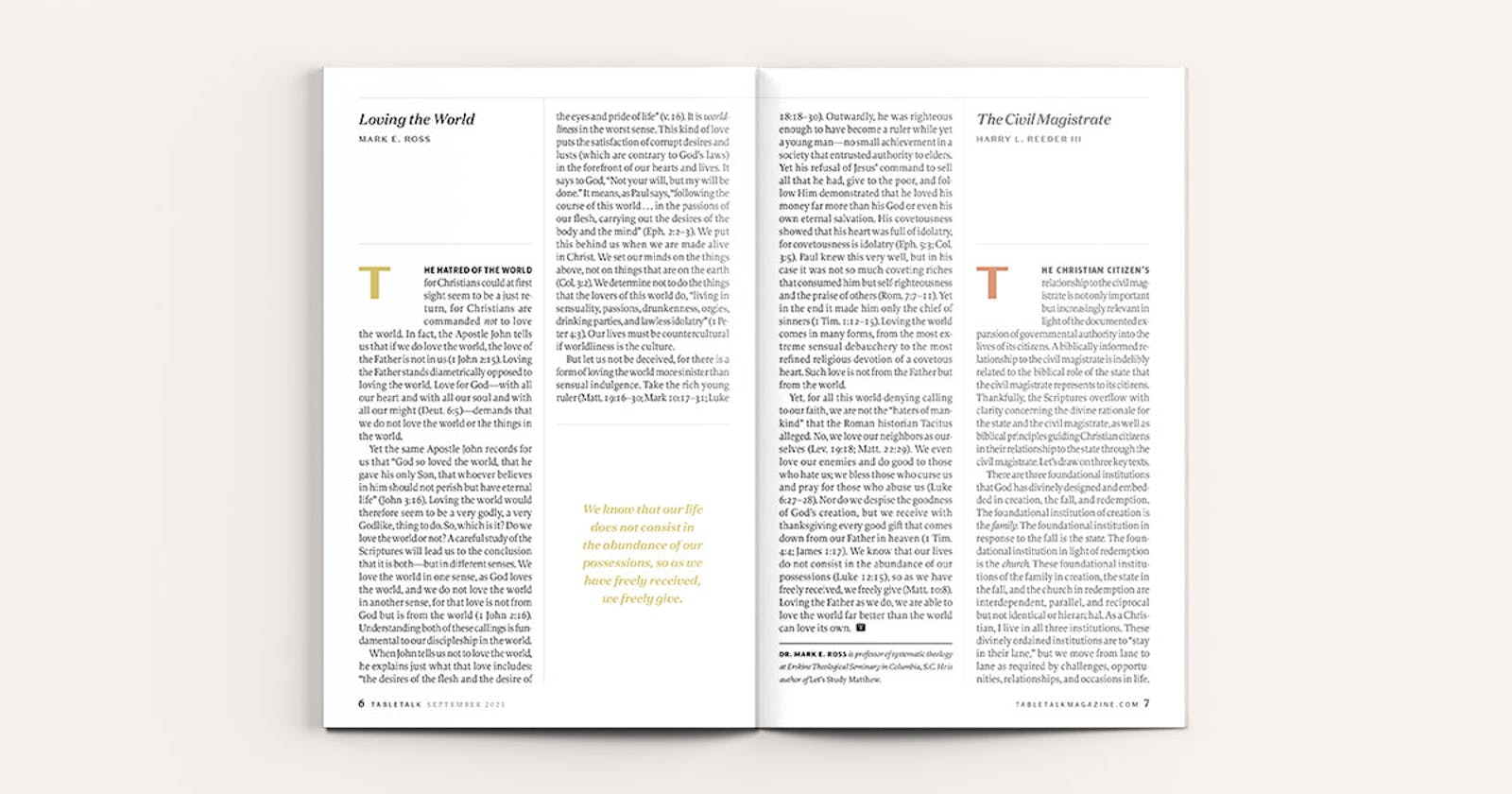
Request your free, three-month trial to Tabletalk magazine. You’ll receive the print issue monthly and gain immediate digital access to decades of archives. This trial is risk-free. No credit card required.
Try Tabletalk NowAlready receive Tabletalk magazine every month?
Verify your email address to gain unlimited access.
The hatred of the world for Christians could at first sight seem to be a just return, for Christians are commanded not to love the world. In fact, the Apostle John tells us that if we do love the world, the love of the Father is not in us (1 John 2:15). Loving the Father stands diametrically opposed to loving the world. Love for God—with all our heart and with all our soul and with all our might (Deut. 6:5)—demands that we do not love the world or the things in the world.
Yet the same Apostle John records for us that “God so loved the world, that he gave his only Son, that whoever believes in him should not perish but have eternal life” (John 3:16). Loving the world would therefore seem to be a very godly, a very Godlike, thing to do. So, which is it? Do we love the world or not? A careful study of the Scriptures will lead us to the conclusion that it is both—but in different senses. We love the world in one sense, as God loves the world, and we do not love the world in another sense, for that love is not from God but is from the world (1 John 2:16). Understanding both of these callings is fundamental to our discipleship in the world.
When John tells us not to love the world, he explains just what that love includes: “the desires of the flesh and the desire of the eyes and pride of life” (v. 16). It is worldliness in the worst sense. This kind of love puts the satisfaction of corrupt desires and lusts (which are contrary to God’s laws) in the forefront of our hearts and lives. It says to God, “Not your will, but my will be done.” It means, as Paul says, “following the course of this world . . . in the passions of our flesh, carrying out the desires of the body and the mind” (Eph. 2:2–3). We put this behind us when we are made alive in Christ. We set our minds on the things above, not on things that are on the earth (Col. 3:2). We determine not to do the things that the lovers of this world do, “living in sensuality, passions, drunkenness, orgies, drinking parties, and lawless idolatry” (1 Peter 4:3). Our lives must be countercultural if worldliness is the culture.
But let us not be deceived, for there is a form of loving the world more sinister than sensual indulgence. Take the rich young ruler (Matt. 19:16–30; Mark 10:17–31; Luke 18:18–30). Outwardly, he was righteous enough to have become a ruler while yet a young man—no small achievement in a society that entrusted authority to elders. Yet his refusal of Jesus’ command to sell all that he had, give to the poor, and follow Him demonstrated that he loved his money far more than his God or even his own eternal salvation. His covetousness showed that his heart was full of idolatry, for covetousness is idolatry (Eph. 5:3; Col. 3:5). Paul knew this very well, but in his case it was not so much coveting riches that consumed him but self-righteousness and the praise of others (Rom. 7:7–11). Yet in the end it made him only the chief of sinners (1 Tim. 1:12–15). Loving the world comes in many forms, from the most extreme sensual debauchery to the most refined religious devotion of a covetous heart. Such love is not from the Father but from the world.

Yet, for all this world-denying calling to our faith, we are not the “haters of mankind” that the Roman historian Tacitus alleged. No, we love our neighbors as ourselves (Lev. 19:18; Matt. 22:29). We even love our enemies and do good to those who hate us; we bless those who curse us and pray for those who abuse us (Luke 6:27–28). Nor do we despise the goodness of God’s creation, but we receive with thanksgiving every good gift that comes down from our Father in heaven (1 Tim. 4:4; James 1:17). We know that our lives do not consist in the abundance of our possessions (Luke 12:15), so as we have freely received, we freely give (Matt. 10:8). Loving the Father as we do, we are able to love the world far better than the world can love its own.
